English Edition

- By CNI
- Category: English Section
- Hits: 686
CNI News
30 July 2023
Due to the administrative rivalry between the Arakan Army (AA) and the State Administration Council (SAC), Rakhine locals are finding it difficult to report for damages coming from the weak rule of law reportedly.
Although robberies are rampant in Sittwe where the SAC's administration is based, they have not been able to take actions against, said Ko Kyaw Min Khaing, a local from Rakhine State to CNI News.
" There were thefts only in the past. But now, not only thefts there are also robberies, assaults, and murders. It's because there are a lot of weaknesses between AA's administration and the SAC's one. It's also because there are weak accountability and responsibility between the two sides, I think. Both sides tend to chase and arrest anyone who they want in urban area. But if a robbery arises, neither of the two sides takes actions against effectively. That's why the robberies have become more daring." he said. Urban residents live with anxiety without mental security because robberies and murders have increased, said Ma Thein May a Sittwe resident. " when the robberies like that are taking place, as a woman, I feel insecure. Am I safe if I go out? And because we are all women living together, it's getting worse." she said to CNI News.

A robbery was occurring at a gold shop in Rakhine State
The motorcycles are stolen and phones are robbed and there are also murders in Sittwe Township. In the same way, there are house burglaries and robberies in gold shops in Mrauk U, Kyauktaw and Taunggoke, said locals.
Two robberies occurred near Sittwe University while students were riding in a taxi in the 2022-2023 academic year, said Sittwe University Students Union on 10th February 2023. Moreover, the two youths heisted a gold shop near the Town Hall in Taunggoke on 28th July, 2023, said locals.
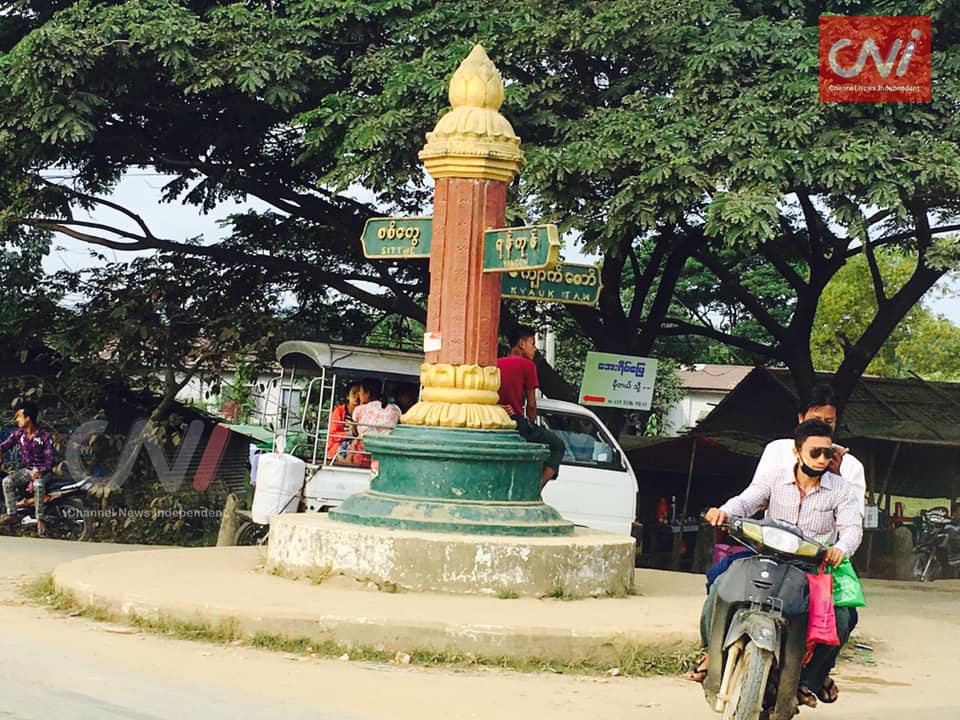
locals from Rakhine State
On 7th April, 2023, a young man heisted a gold shop with a fake gun in Mrauk U Township reportedly. Although there are no battles between the Tatmadaw and AA at present, there are competitions in administrative sector and in organizing the publics reportedly.
Although thefts and robberies are taking place every now and then in some townships in Rakhine State, locals are finding it difficult without knowing which organization they should ask for help, said locals.

- By CNI
- Category: English Section
- Hits: 532
CNI News
30 July 2023
Because business people are making speculations on foodstuff prices under the pretext of 20,000 kyat banknotes that will be issued, although the prices of rice have risen, the prices will fall again in two months, said rice farmers and traders.
Although the prices of rice usually rise in July and August, because the news that 20,000 kyat notes will be issued came out, rice prices went up even more.
At present, the prices of commodities including rice have come to rise due to reporting 20,000 kyat notes will be issued, but the prices of rice will fall again in October when the rain rice is available, said U Thein Aung, chairman of the Farmers Development Association, to CNI News.
" The prices of rice tend to go up a little at a time like this, but under the business people's pretext that 20,000 kyat note will be issued, the prices are raised and all the prices are going up. If one billion 10,000 kyat notes were printed without issuing 20,000 kyat notes, who would know that? That all prices are going up is the action of the businessmen. When it's time to harvest rice in October, the businessmen drop the prices. And then, the prices will surely fall." he said.
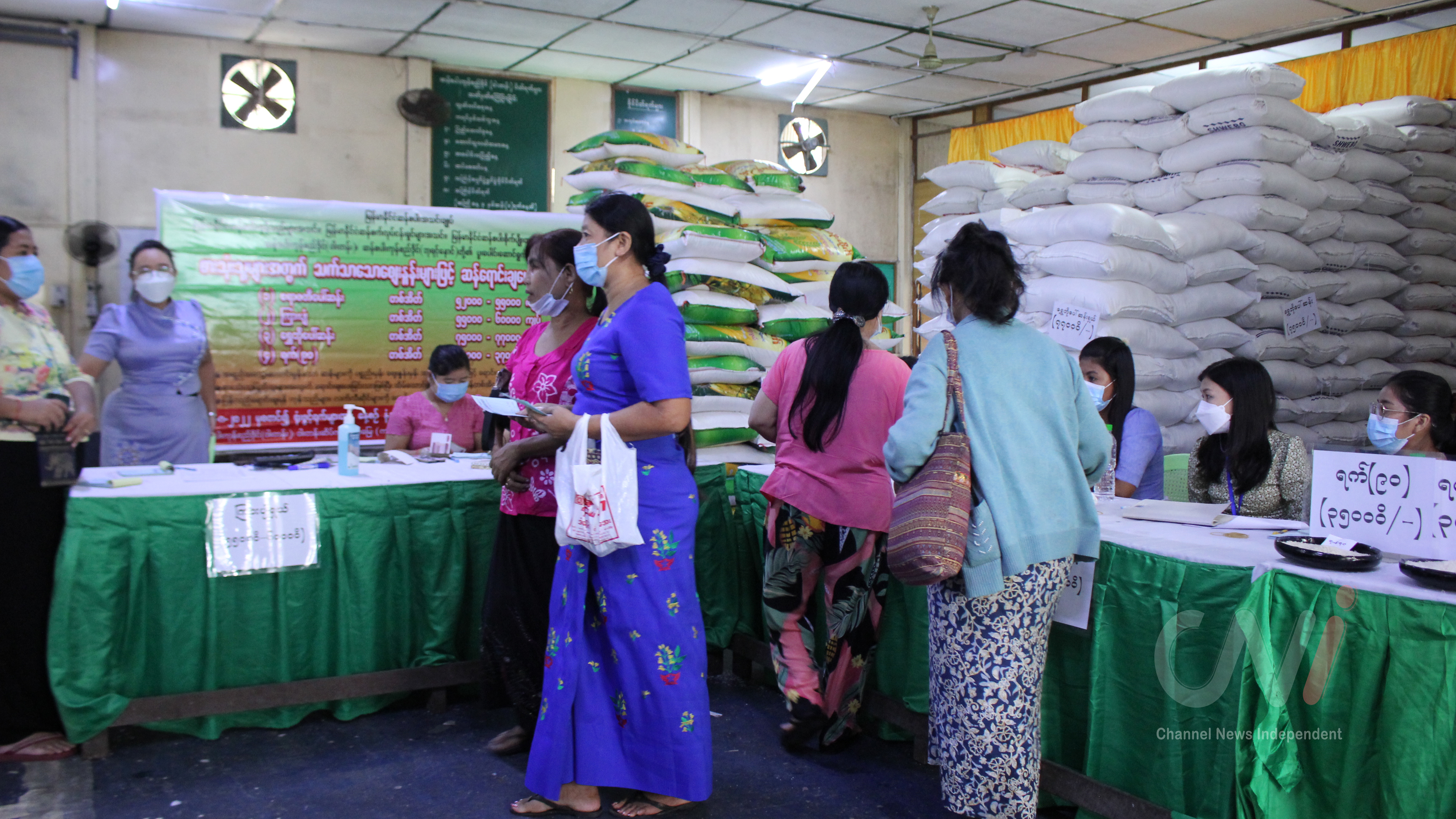
rice was being sold
There are 37 million acres of rainfed rice in Ayeyarwady, 2 million acres in Yangon Region and 35 million acres in Bago Region. Rainfed rice will appear abundantly in October, November and December and the prices of rice also decrease, said farmers. At present, the prices of rice are going up from 2,000 to 3,000 kyats a bag (about 105 lb) and the prices of Shwebo Paw San are going up from 5,000 to 6,000 kyats, said U Zaw Khaing, joint secretary of Wahdan Commodity Depot in Yangon Region to CNI News.
The local prices of rice depend on exporting and as export revenue policy is relaxed, rice is being bought increasingly to be exported. So, the prices at the same time tend to rise, said U Than Oo, secretary of Bayintnaung Rice Commodity Depot to CNI News.
" If exporters don't buy rice, the prices fall. If they buy, the prices go up a little. The rice yield will be low in Augusta and October and so those who store rice will sell their rice at the end of October when new rice appears. It seems at all less likely to drop the prices." he said.
Although the price of rice that is exported was about 53,000 kyats a bag before, now is about 58,000 kyats because the demand is high reportedly.
The rice whose price is about 60,000 kyats a bag is currently being increasingly bought reportedly from the Bayintnaung Commodity Depot.

- By CNI
- Category: English Section
- Hits: 606
CNI News
30 July 2023
The chairman of the State Administration Council should deliver a speech that can capture the hearts of the people and ethnic armed organizations, said U Kyaw Zeya, former member of Hluttaw to CNI News.
Because that the six months had been extended will expire on 31st July, the speech the chairman of the SAC would deliver to the State whether he would extend the state of emergency for another six months or not was important, he said.
" What I want to give a bit of advice, the National Defense and Security Council is called and at that meeting, the speech Sr-Gen Min Aung Hlaing will deliver to the State is very important. The kinds of phrases that can capture the hearts of the people and ethnic armed groups should be chosen to put in the speech. Some people who are better than me know what kinds of phrases should be chosen. The phrases like that should be carefully chosen." he said to CNI News.
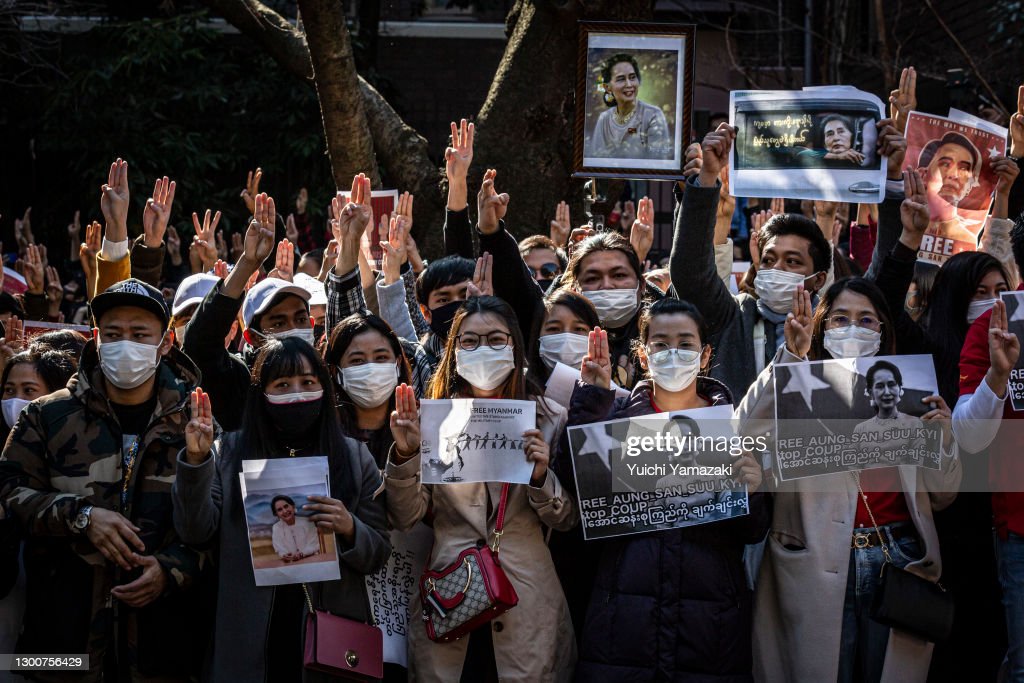
People who support Daw Aung San Suu Kyi
That the state of emergency had been extended in accordance with the Section 425 of the constitution on 31st January will expire on 31st July.
There are various comments among political circle about whether the state of emergency can be extended for another six months or not and what kind of political landscape can arise.
The chairman of the SAC should deliver a speech that help to make the country stable rather than speaking about the SAC's political objectives, said U Kyaw Zeya.
" He have repeatedly talked about political objectives and religion. So, he should deliver a speech that can capture the hearts of the people. They(the Tatmadaw and its supporters) don't want to very much recognize, but they must know the reality. The reality here means Daw Aung San Suu Kyi's current situation. In any case, she still has power to an extent.That must be talked. The speech Sr-Gen Min Aung Hlaing will deliver on 31st July to the people should be the one that can work for the stability of the country that I'd like to advise." he said.
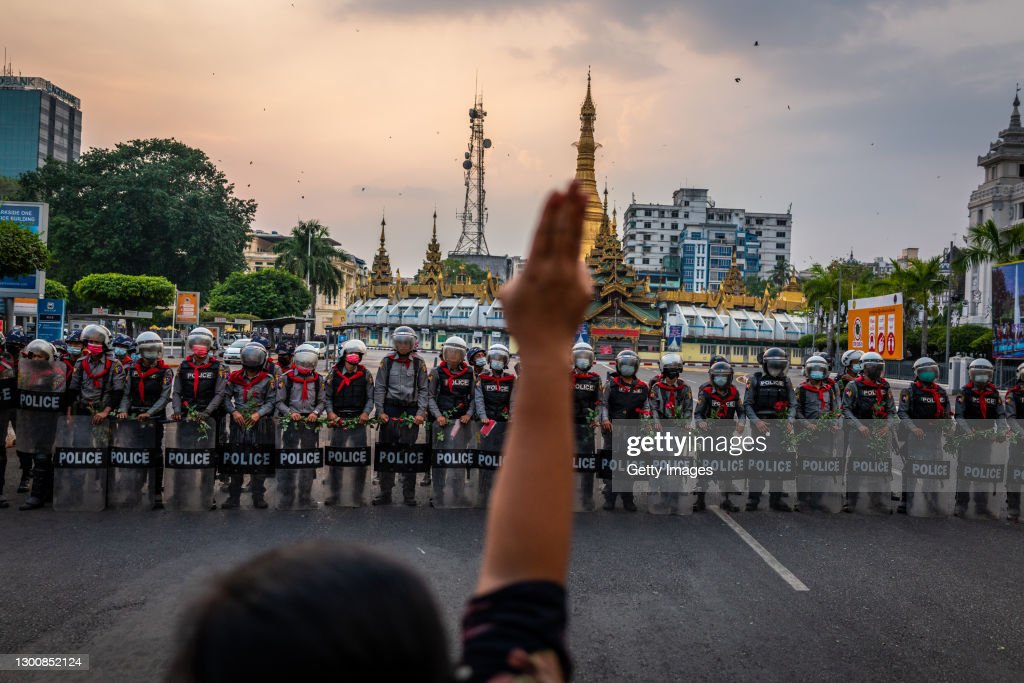
People demanding democracy
The Tatmadaw ousted the NLD government on 1st February 2021 after saying that NLD tried to form a government without solving the ballot dispute that took place in the 2020 general election and has declared the state of emergency.
The state of emergency was two years long in January 2023.
Although that the emergency period was extended for six months in accordance with the Section 425 of the constitution will expire on 31st July, the SAC has the rights to extend the state of emergency for another six months.
An interim or transitional government might be formed without extending for another six months, commented the people from the local political circle.

- By CNI
- Category: English Section
- Hits: 618
CNI News
29 July 2023
Due to skyrocketing commodity prices, the people's livelihood crises have arisen and it can cause psychological damage to the people, said housewives and small-scale business people.
Commodity prices that have risen gradually because of political instabilities that have been arising since 2021 have risen more than before during the past few days.
So, the people are facing an unbalanced situation of income and expenditure, said Daw Than Yaing Sein, a housewife from Sittwe Township, Rakhine State to CNI News.
" The money earned from working can't catch up with rising prices. We are not alone. Everybody is disappointed. We don't want to prices to go up. The poor get into trouble. Thieves and robberies have increased. If the prices go up more than now, it will worsens. Sometimes I feel so confused." she said.
Because of prices going up like that, small-scale business people were also finding it difficult, said Daw Sandar who is doing business of pottery to CNI News.
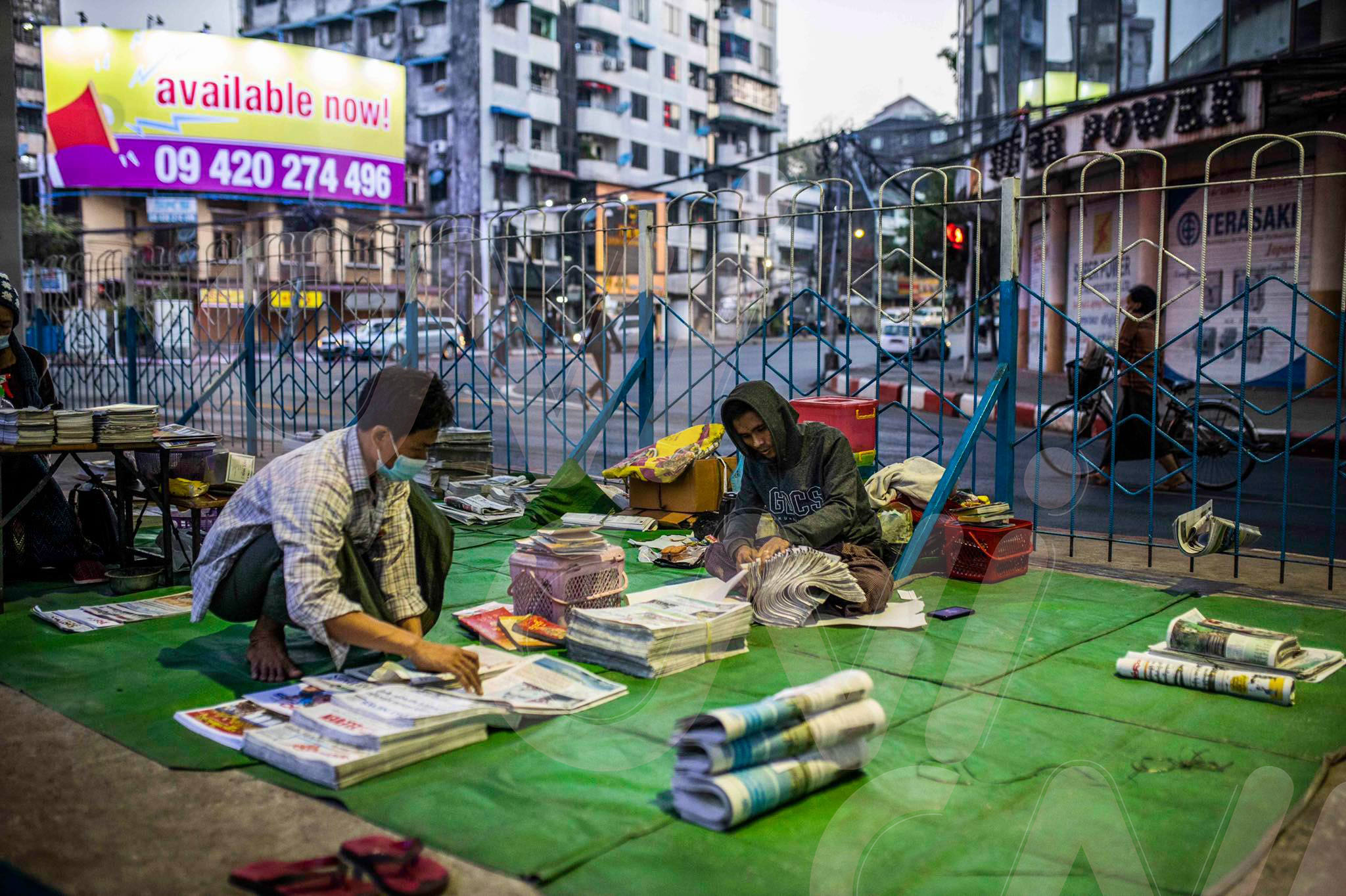
street vendors selling journals (Photo-CNI)
" Since we heard 20,000 kyat notes will be issued, prices have gone up.I'm so disappointed that I don't want to go on working, but it's impossible to do so. We don't dare to go up our prices because we don't sell foodstuff. We don't know how much we'll have to pay the workers. We pay them 5,000 kyats each day. On the days when they have to work hard, they are paid 7,000 Kyats a day. We want to pay more. But we can't. There are only watercress dish and fried fish paste in their lunch boxes. We are sorry to see them." she said.
Because the livelihood becomes difficult with the commodity prices going up, some people might commit suicides, said U Thet Zaw, an economic analyst to CNI News.
" If there's no way out, anything may happen to a man. Finally, he can even commit suicide." he said.
Since the Central Bank released a statement which said it would issue new 20,000 kyat notes in a limited number, the prices of basic foodstuff, consumer goods, fuel, gold, dollar have gone up, which has adversely affected to the lower class and small-scale business people, said business people.
The price of Paw San Hmwe was 95,000 kyats for a bag (about 105 lb) before, now is over 100,000 kyats and the price of cooking palm oil was 8,400 kyats a viss(3.6 lb) before and now is over 13,000 kyats reportedly.
Relevant governments and departmental officials should effectively take actions against speculators who are performing to raise prices to solve the livelihood crisis, pointed out economic analysts.

- By CNI
- Category: English Section
- Hits: 895
CNI News
29 July 2023
There are reviews and discussions among political circles local and abroad regarding up to what status has been built in the military relation between Thailand and Myanmar.
There had been the military relation between the two countries since before and it was difficult to say whether it was the relation between the two civilian governments or not, said Yebaw Sonny from All Burma Students' Democratic Front (ABSDF) to CNI News.
"There has been the previously-existed military relation between the two countries up to now, I think. But based on that relation, I wonder if they have built the relation between the two civilian governments. It's very difficult to review. They will know themselves what kind of relation has been built."

Myanmar Army Chief of Defense General Min Aung Hlaing during a meeting in Rakhine State
There has been friendly relation between the Tatmadaw and Thai army and Thai Foreign Minister and senior officials often come to Myanmar after the Tatmadaw has taken the power on 1st February, 2021.
There are often meetings and discussions between the two armies and no matter what government takes power, Thai policy relating to the Tatmadaw would not change, Ko Banyar, director of Kareni Human Rights Organization to CNI News.
"There was a military meeting between the two armies under the heading of being enable Thailand and Myanmar to live together in peace forever in Chinmai in the last week of June. Thai Foreign Minister is also very friendly with the Tatmadaw and Sr-Gen Min Aung Hlaing has been very friendly with Prayut, Thai PM since before. There are common interests and thoughts between the two armies. So, Thai military policy relating to Myanmar will not easily change. There are a lot of Thai interest. No matter which party takes power in Thailand, there's still the influence of the Thai King." he said.
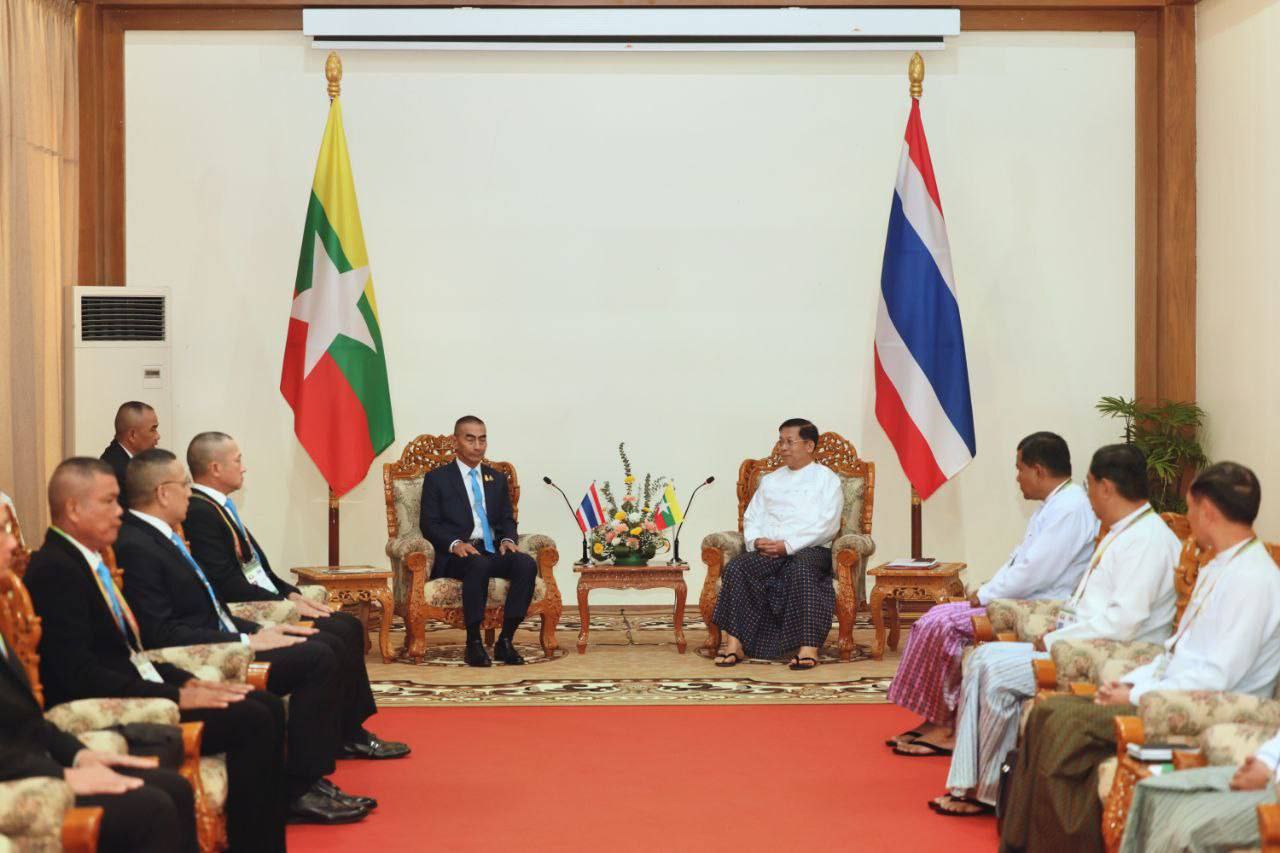
Sr-Gen Min Aung Hlaing was meeting with Don Pramudwinai, Thai Deputy Prime Minister
There are still cooperation in border affairs, trade and security between the two armies. Moreover, Myanmar ethnic armed organizations have been active along the border, there are good relations between the two armies, according to some reviews.

- By CNI
- Category: English Section
- Hits: 932
CNI News
28 July 2023
Mr.Deng Xijuan, China's special envoy for Asian Affairs met with Lt-Gen Yar Pyae, minister of the Office of the Union Government and chairman of the National Solidarity and Peacemaking Negotiation Committee (NSPNC) in Naypyidaw on 27th July, 2023.
They discussed about Myanmar-China friendly cooperation, peace and stability in the border area and implementation of Myanmar's peace processes reportedly.
This is the third time trip for the Chinese special envoy to Myanmar and he came to Myanmar in December 2022 for the first time.
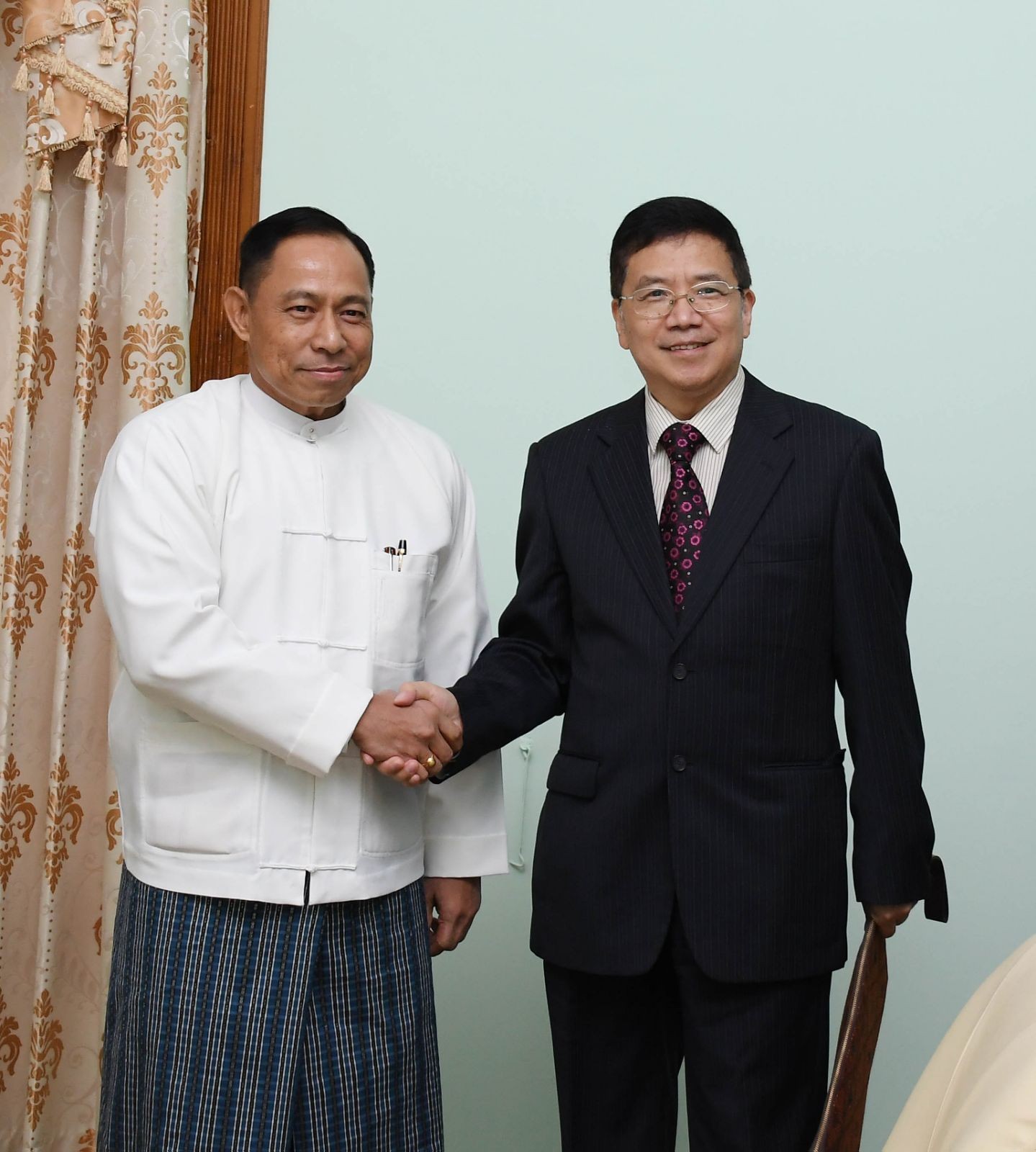
China's special envoy Mr. Deng Xijun
For the time being, battles are taking place between the Kachin Independence Army and the Tatmadaw near Nam Sang Yang Village in Bamaw Township, Kachin State in the China-Myanmar border area, and battles are breaking out between the Ta,ang National Liberation Army (TNLA) and the Tatmadaw.
That the state of emergency has been extended will expire on 31st July and the Chinese special envoy arrived in Myanmar when it is very drawing near to make a decision whether the state of emergency will be extended for another six months or not.

- By CNI
- Category: English Section
- Hits: 1080
CNI News
28 July 2023
There is a military tension between Shanni Nationalities Army (SNA) and Kachin Independence Army (KIA)/ People's Defense Force (PDF) joint forces near Naung Bo Aung
Village in Homalin Township, Sagaing Region reportedly battle took place between SNA and KIA/PDF joint forces in Hlwa Zin Gon Village in the morning on 21st July, 2023 and the two sides are in military tension.
Moreover, local residents from Hlwa Zin Gon and Aung Bin villages have displaced, said a local resident to CNI News.
SNA forces have deployed at Hlwa Zin Gon and KIA/PDF joint forces, at Aung Bin Village, so battles may take place at any time." Because the sides fired with big weapons each other, villagers from the two villages did not dare to go on living in their villages, he said.
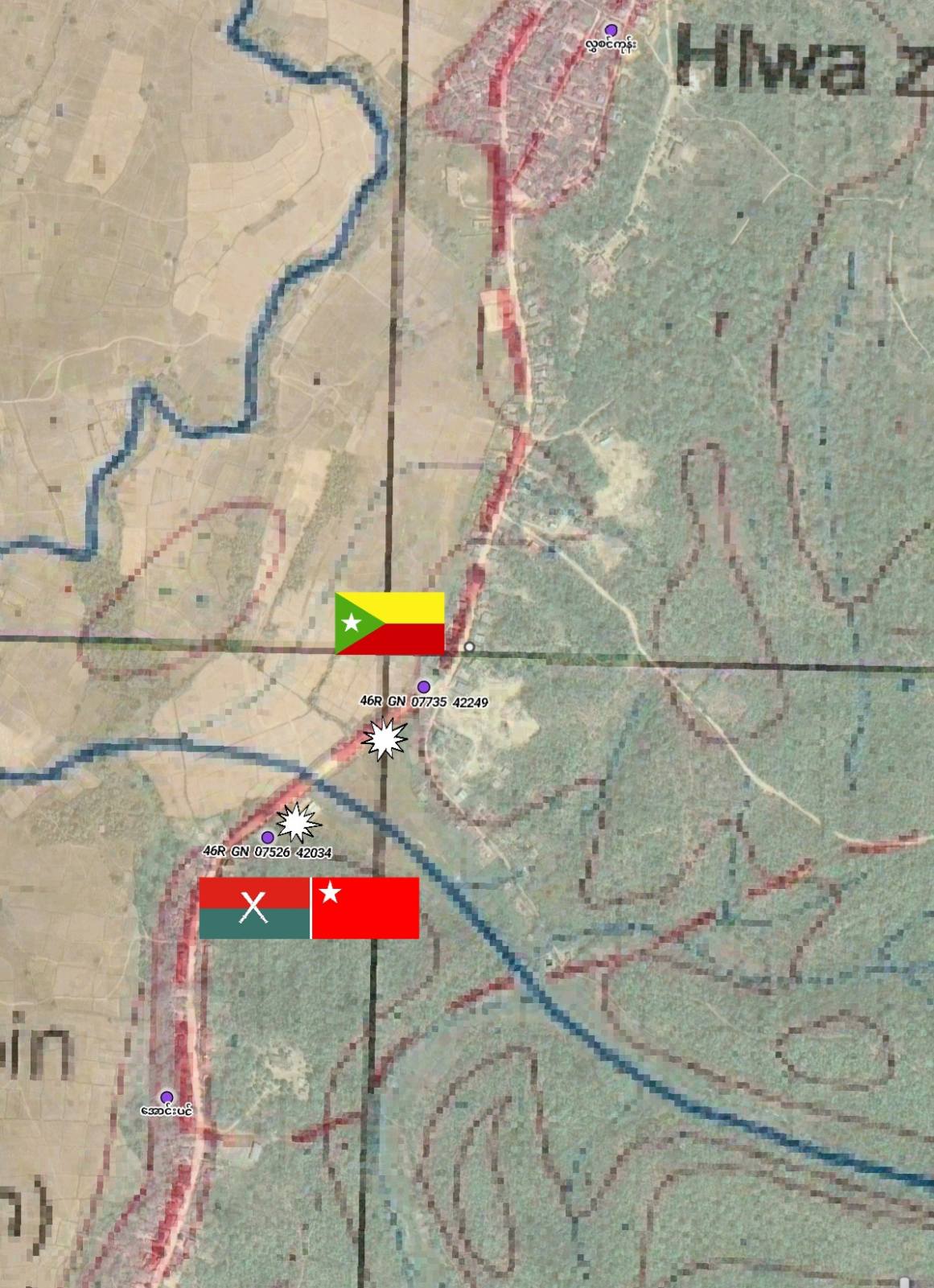
The place where a battle took place between SNA and KIA/PDF joint forces
There are over 300 households in Hlwa Zin Gon and about 70 households in Aung Bin. Due to the battle, villagers from the two villages have migrated to Naung Bo Aung, Min Bwe and Thaphan Gone villages, he added.
" They have just surrounded us. Sometimes, some of them fired from a distance and run away. That's all." said Lt-Col Sai Aung Mein, spokesperson of the SNA.

HPDF-124 that is being active in Homalin Township
The battles between SNA and KIA/PDF joint forces are taking place in Banmauk Township and although KIA/PDF have wanted to penetrate into Homalin Township through Banmauk Township, they haven't able to penetrate as yet and have been active more reliably on Nam Nan - Naung Bo Aung route reportedly.
SNA is an ethnic armed organization that is struggling to establish the Shanni State containing Maulike District, Kalay District, Khamti District, Kathar District and Tamu District in Sagaing Region and Bamaw District, Myitkyina District, and Mohnyin District in Kachin State.

- By CNI
- Category: English Section
- Hits: 773
CNI News
28 July 2023
Media coverage impacts peace, stability,development and unity a lot and so, media need to be ones that help to build unity, said U Maung Maung Ohn, Information Minister of the State Administration Council. He said as above at the workshop on the four pillars held in Horizon Lake View on 26th July, 2023.
The workshop was intended to build mutual-respect relations between the media, the fourth pillar, and three other pillars _ legislation, administration and judiciary based on media ethics and develop cooperation, to develop Myanmar news media, to win more rights to information independently, to build better relations among the four pillars and mutual collaboration regarding rights to information, said in the report.
"Media called the fourth pillar is serving the duty to make three other pillars correct on behalf of the people and so it's necessary to perform mutually regarding the rights to information and reportings by media very much impact on the country's peace, stability, development and unity, so media need to be ones that help to build unity." said U Maung Maung Ohn, Information Minister of the SAC.
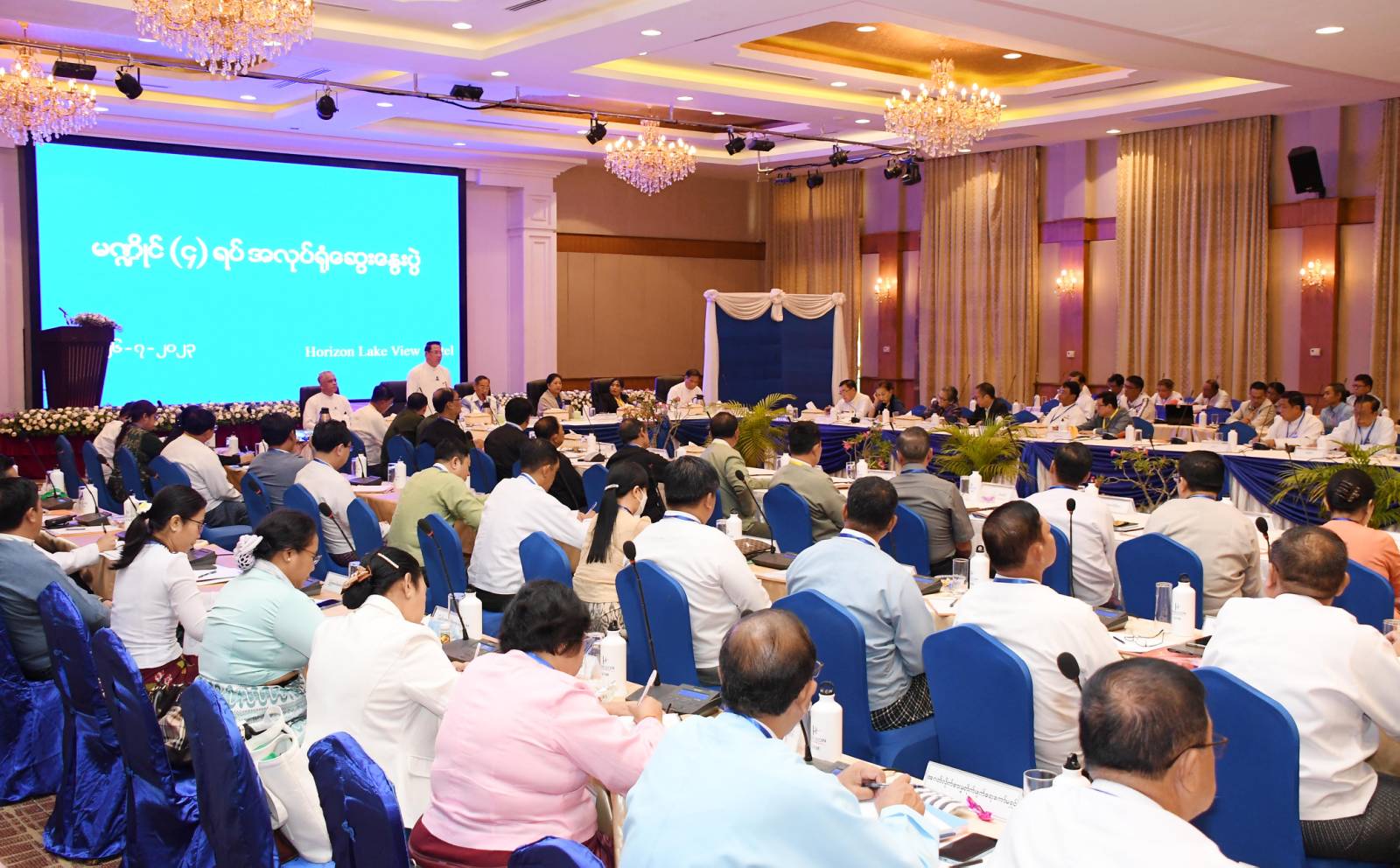
the meeting of the four pillars was being held
No matter what political system was applied, unity among the government, the people and organizations all was needed and the media should carry out emphatically to strengthen these situations, he added.
" It's nice to hold a meeting among the four pillars, but I wonder how many reporters who learned journalism and are hunting news with journalistic standards came here. If only they attended, we could know transparently what's happening really. If so-called reporters who are standing on only one side or who have never been journalists attended, it would be difficult to find the way to close the gap among the four pillars, I think. Every government tends to see journalists as enemies or critics rather than as friends. Because pieces of information were not released or answered in real time, it would be weak in building the peace and stability of the country.The public is trapped between misinformation. To overcome that, the authorities must open the freedom of the press and release the information in real time. Journalists must report in accordance with the journalistic standards." said a news media person.
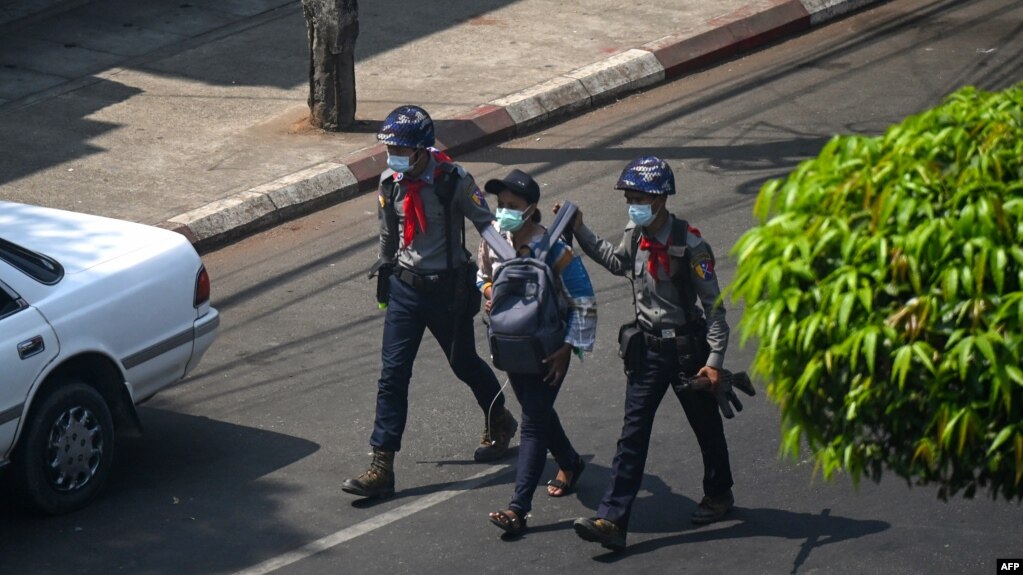
Ma Kay Zin Nwe from Myanmar Now news agency was being arrested on 27th February 2021
The Tatmadaw toppled down the NLD government on 1st February, 2021 after saying that the NLD was trying to form a government without solving the ballot dispute that took place in the 2008 general election and had announced the state of emergency.
After that, the freedom of the press was reduced when news media persons were arrested and news agencies were closed.
On the other hand,some journalists are weak to abide by the journalistic standards and have been reporting for the sake of the side they are supporting and become weak in scrutinizing facts and information on the ground.

- By CNI
- Category: English Section
- Hits: 625
CNI News
28 July 2023
The issuance of 20,000 kyat notes would not cause monetary inflation and but it was a political attack to cause economic chaos, said Sr-Gen Min Aung Hlaing, chairman of the State Administration Council.
He said as above at the meeting of economic committee held on 26th July, 2023.
New 20,000 kyat notes would be produced in a limited number and the State had no financial need.
Moreover, monetary circulation within the country was also balanced. And 20,000 kyat notes would be only issued in commemoration and monetary circulation within the country had come back to the normal situation.
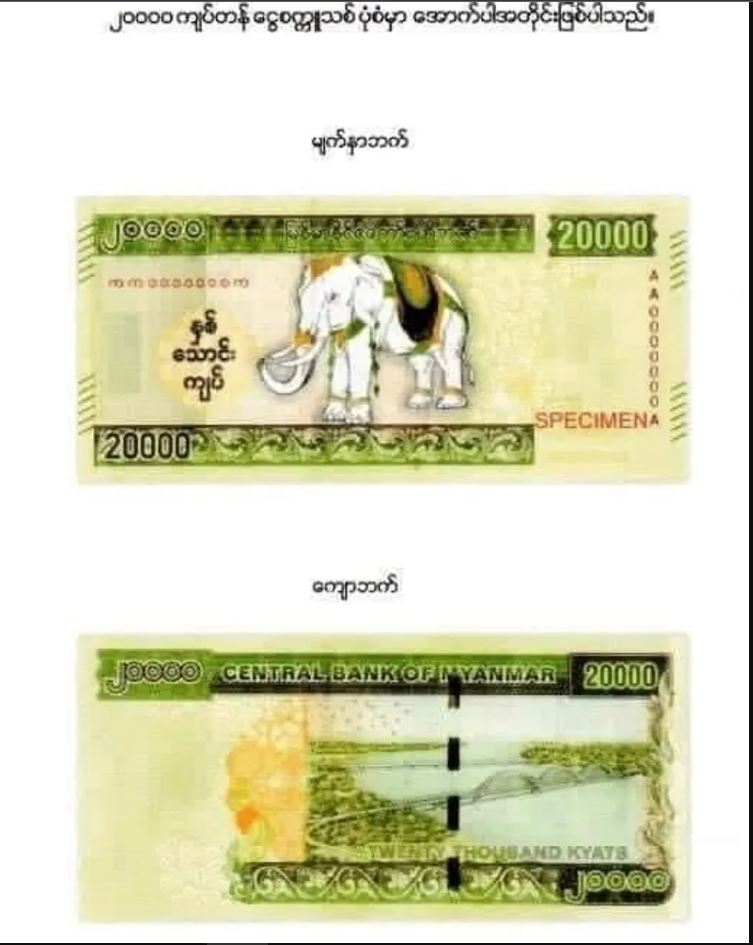
Design of a 20,000 kyat note
Besides, there were also many financial deposits in banks, said Sr-Gen Min Aung Hlaing.
"Insuance of 20,000 kyat notes won't cause the monetary inflation at all and opposition elements are attacking politically to cause economic chaos. Government businesses are to help the development of the country rather than to make a profit. But there shouldn't be making a loss. The economic committee plays an important role and I want the committee to pay attention to promote the national economy." he said.
adding that he wanted it to carry out the tasks with a view to the benefit of the country.
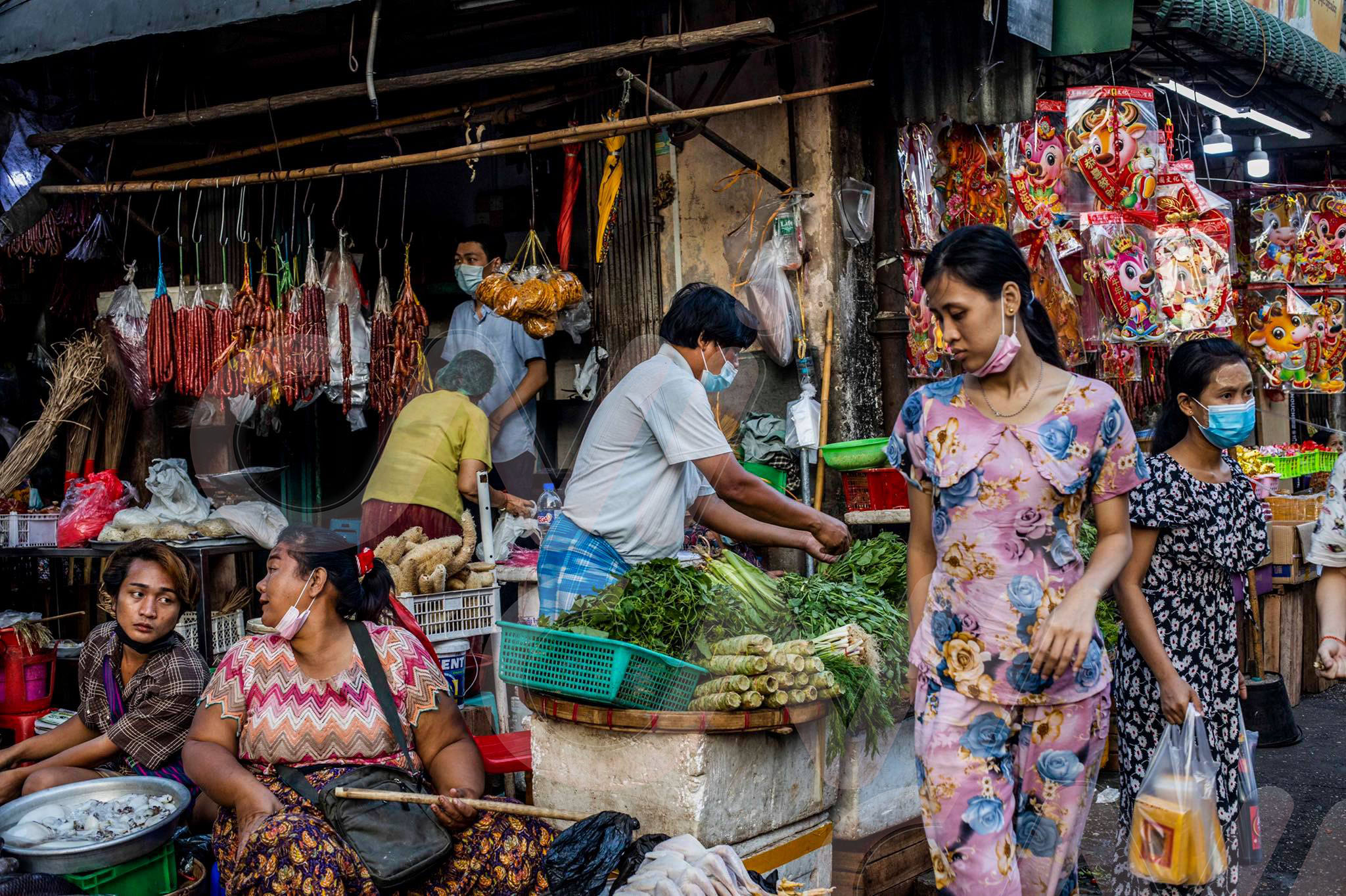
A foodstuff seller
" Ordinary civilians will think that monetary inflation will increase because new banknote is the two times of the current highest denomination banknote. if new banknotes that will be issued are 10,000 Kyat notes, the people's interpretation will be indifferent. But when they know that 20,000 Kyat notes will be issued, the people who understand or do not understand economics get shocked. So, because the people know or believe that commodity prices will go up, they are buying the goods more and more. But most of our people are still weak in economic knowledge in comparison with the people in the neighboring countries." said U Htay Aung Kyi, an economist to CNI News.
Since the Central Bank announced that it would issue 20,000 kyat notes on 31st July, the prices of foodstuff, cosmetics, gold, dollar, real estate, car and so on have skyrocketed.



